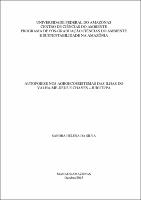| ???jsp.display-item.social.title??? |


|
Please use this identifier to cite or link to this item:
https://tede.ufam.edu.br/handle/tede/5042| ???metadata.dc.type???: | Tese |
| Title: | Autopoiese nos agroecossistemas das Ilhas do Valha-me-Deus e Chaves – Juruti/PA |
| ???metadata.dc.creator???: | Silva, Sandra Helena  |
| ???metadata.dc.contributor.advisor1???: | Noda, Sandra do Nascimento |
| ???metadata.dc.description.resumo???: | Compreender as estratégias para a conservação, nas Ilhas do Valha-me-Deus e Chaves, ambas localizadas no município de Juruti/PA, foi o objetivo central desse estudo. Para tanto, foram realizadas análises sobre o sistema ambiental das Ilhas, em seus aspectos eco-bio-sócio-culturais. Os conceitos de autopoiese, organização, sustentabilidade, adaptabilidade foram às referências teóricas para compreensão das ações estratégicas de conservação da autopoiese de mulheres cultivadoras nos agroecossistemas locais. A pesquisa seguiu o modelo de estudo de caso múltiplos, tendo como base epistemológica o paradigma dialético da complexidade sistêmica. Foram utilizadas entrevistas informais, com roteiro prévio e histórias de vida. Além da observação sistemática sobre o sistema ambiental das Ilhas, durante março de 2013 a maio de 2015. Os dados transcritos indicaram limitações para a conservação da autopoiese no ambiente das Ilhas pesquisadas, tanto para os seres humanos, quanto nas formações ambientais, como a fauna e flora. Entre as limitações estão às próprias mudanças climáticas mais recentes, gerando inundações extremas, nas várzeas afetando as unidades produtivas. As fragilidades nas políticas públicas agrícolas e sociais deixam os agricultores a própria sorte, indicando o movimento do capital na mobilização da força de trabalho, na busca de condições financeiras nas cidades; introdução de animais de grande porte, os bubalinos na Ilha do Valha-me-Deus, gerando perdas ambientais. Os dados indicaram perdas e ressignificações no modo de vida, com novos arquétipos, regras e doutrinas impostas pelo Estado e a Igreja, repercutindo nas relações familiares, com perdas dos acervos culturais reconstruídos ao longo das gerações. Como estratégias de resistência na manutenção de suas unidades produtivas, as cultivadoras têm buscado desenvolver atividades diversas, geradoras de renda monetária, caracterizando a pluriatividade, em especial na Ilha do Valha-me-Deus. A conservação da autopoiese das cultivadoras das Ilhas mantém-se, entre os estados de ordem e desordem desencadeados pelas interferências econômicas, sociais e ambientais, promovendo continuamente uma reconstrução cultural. Nessa, há perdas de saberes sobre si mesmo e sobre o sistema ambiental vivenciado, colocando em risco a sustentabilidade nas Ilhas. |
| Abstract: | To understand the strategies for conservation the Valha-me-Deus and Chaves Islands, both located at Juruti/PA, was the mais objective of this study. For that, there were made analysis about the environmental sistem of the islands, in their eco-bio-socio-cultural aspects. The concepts of autopoiese, organization, sustainability and adaptability were the theorical references to comprehend the strategic actions of autopoiese’s conservation from cultivators women at local agroecosystems. The research followed the study of multiple cases’ model, epistemologically based on the dialetic paradigm of the systemic complexity. There were used informal interviews, with previous script and stories of life. Beyond the systemic observation about the environmental system of the Islands, from March 2013 to May 2015. The transcript data indicated limitations to preserve the autopiese at the studied Islands, both to the human beings and the environmental backgrounds, as the fauna and the flora. Among the limitations are the most recent climate changes, that generates extreme floods at the varzeas, affecting the productive units. The fragilities found at the public agricultural and social politics leave the farmers at their own luck, showing the capital move to mobilizate the larbor force, in the search of financial conditions at the cities, introdution of large animals, the water buffaloes at the Valha-me-Deus Island, resulting in big environmental loses. The data indicates losses and ressignification in the way of life, with new archetypes, rules and doctrines imposed by the State and the Church, reflecting at the familiar relations, losing its culturals collections that were rebuilt over generations. As resistance strategy to the maintenance of their productive units, the cultivators have been trying to develop several activities, that generates monetary income, featuring the pluri-activity, specially at the Valha-me-Deus Island. The autopoiese’s conservation of the cultivators from the Island are kept, between the states of order and disorder unleashed by the economic, social and environmental interferences, promoting steadily a cultural reconstruction. In that, some knowledge of themselves and of the environmental system are lost, endangering the Islands sustainability. |
| Keywords: | Conservação ambiental Sustentabilidade Várzeas amazônicas Sustainability Amazonic floodplains |
| ???metadata.dc.subject.cnpq???: | CIÊNCIAS AGRÁRIAS |
| Language: | por |
| ???metadata.dc.publisher.country???: | Brasil |
| Publisher: | Universidade Federal do Amazonas |
| ???metadata.dc.publisher.initials???: | UFAM |
| ???metadata.dc.publisher.department???: | Faculdade de Ciências Agrárias |
| ???metadata.dc.publisher.program???: | Programa de Pós-graduação em Ciências do Ambiente e Sustentabilidade na Amazônia |
| Citation: | SILVA, Sandra Helena da. Autopoiese nos agroecossistemas das Ilhas do Valha-me-Deus e Chaves – Juruti/PA. 2015. 237 f. Tese (Doutorado em Ciências do Ambiente e Sustentabilidade na Amazônia) - Universidade Federal do Amazonas, Manaus, 2015. |
| ???metadata.dc.rights???: | Acesso Aberto |
| URI: | http://tede.ufam.edu.br/handle/tede/5042 |
| Issue Date: | 16-Oct-2015 |
| Appears in Collections: | Doutorado em Ciências do Ambiente e Sustentabilidade na Amazônia |
Files in This Item:
| File | Description | Size | Format | |
|---|---|---|---|---|
| Dissertação - Sandra Helena da Silva.pdf | Reprodução Total Autorizada | 4.54 MB | Adobe PDF |  Download/Open Preview |
Items in DSpace are protected by copyright, with all rights reserved, unless otherwise indicated.




